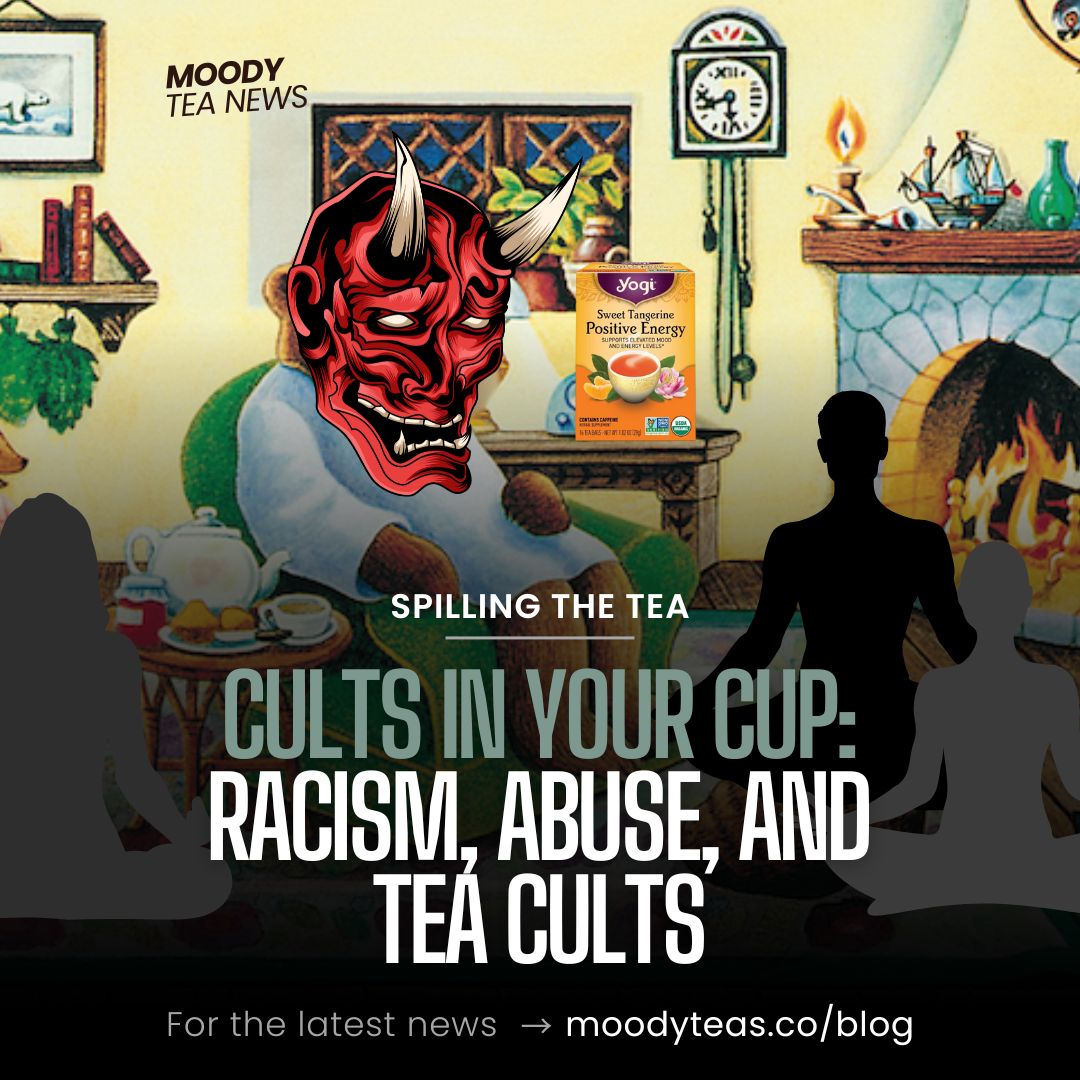At Moody Teas, we pride ourselves on transparency and ethical sourcing, values we hold dear as we strive to provide high-quality teas that both taste great and align with our ethical standards. It’s vital to shed light on the controversial and, frankly, disturbing backgrounds of some popular tea brands. Today, we’re diving into the dark histories of Celestial Seasonings and Yogi Tea, two well-loved brands with troubling connections to cults, racism, and sexual abuse. Grab a cup of Moody Teas and get ready for some unsettling tea-spilling.
Celestial Seasonings: The Troubling Legacy of Mo Siegel
Celestial Seasonings, known for its soothing Sleepytime Tea, harbors a history that is anything but calming. Founded in 1969 by Mo Siegel, the brand quickly became a household name. However, Siegel’s philosophical and spiritual leanings have raised serious ethical concerns over the years.

The Urantia Book: A Controversial Influence
Mo Siegel was an ardent follower of the Urantia Book, a dense and controversial text claiming to be a revelation from celestial beings. The book presents a complex cosmology and purports to offer a detailed account of Earth’s history and its place in the universe. While it has a small but dedicated following, many critics consider it pseudoscientific and, at times, racially problematic.
Origins and Beliefs of the Urantia Book
The Urantia Book was first published in 1955 by the Urantia Foundation. The book is divided into four parts, covering topics such as the nature of God, the organization of the universe, the history of Earth, and the life and teachings of Jesus. It claims to be a revelation from celestial beings, providing a new understanding of spiritual and cosmological truths.
One of the most controversial aspects of the Urantia Book is its treatment of race. The book suggests a hierarchical classification of races, which has been widely criticized as racist and eugenicist. It describes certain races as more “advanced” and others as “inferior,” perpetuating harmful and outdated notions of racial superiority. So, next time you sip on Sleepytime, remember that it’s brought to you by someone who thinks Adam and Eve were racist aliens (and that’s somehow a good thing…?).
Mo Siegel’s Devotion and Influence
Siegel’s devotion to the Urantia Book heavily influenced his vision for Celestial Seasonings. He saw the tea company as a vehicle to spread the book’s teachings and even used passages from it in the company’s early advertising and product names. Siegel was deeply committed to the Urantia Book’s ideals and aimed to infuse these into the brand’s identity and mission. Because nothing says “relaxation” like a side of eugenics with your chamomile.
Racist Ideologies and Eugenics
The Urantia Book has faced severe criticism for its views on race and eugenics. Some passages suggest a hierarchy of races, which is deeply troubling and blatantly racist. While Siegel himself may not have publicly endorsed these specific views, his close association with the book casts a long, dark shadow over Celestial Seasonings. Critics argue that supporting the company indirectly supports the propagation of these deeply offensive and harmful ideologies. And you thought the bear in pajamas was the weirdest thing on the label….
Exploitation of Spiritual Beliefs
Using a company to promote such controversial beliefs raises significant ethical questions. The exploitation of spiritual beliefs for commercial gain is manipulative and deceptive. Siegel’s integration of the Urantia Book’s teachings into Celestial Seasonings’ branding and marketing strategies is a clear example of how spirituality can be commodified, often at the expense of unsuspecting consumers who might be unaware of the underlying agenda. Who knew your afternoon tea could come with a side of celestial indoctrination?
Yogi Tea: The Dark Side of the 3HO Movement
Yogi Tea, another popular brand, has its own controversial connections that are equally disturbing. The brand was founded by followers of Yogi Bhajan, the leader of the Healthy, Happy, Holy Organization (3HO), a religious movement combining Kundalini Yoga with Sikh traditions. While many people associate Yogi Tea with wellness and spirituality, the story behind its origins is far more troubling.

Yogi Bhajan and the 3HO: A Leader Shrouded in Controversy
Yogi Bhajan, born Harbhajan Singh Khalsa, emigrated from India to the United States in the late 1960s and quickly gained a following for his teachings on Kundalini Yoga. He founded 3HO in 1969, and the organization has since grown into a global movement. However, Bhajan’s legacy is not without significant controversy.
Origins and Beliefs of the 3HO Movement
The 3HO movement combines elements of Kundalini Yoga, Sikhism, and various New Age practices. Yogi Bhajan claimed that Kundalini Yoga was a powerful practice that could awaken spiritual energy and lead to higher consciousness. He also integrated Sikh practices, including the wearing of turbans and white clothing, into his teachings.
3HO promotes a lifestyle of healthy living, vegetarianism, and community service. It has established numerous ashrams, yoga centers, and businesses worldwide, including the Yogi Tea brand. However, beneath this veneer of health and spirituality lies a troubling history of abuse and manipulation. Because nothing says “holistic health” like a leader with a penchant for control.
Sexual Abuse Allegations
Multiple former followers have accused Yogi Bhajan of sexual misconduct, abuse, and cult-like practices within 3HO. An article by Women of Grace details these allegations, painting a deeply troubling picture of life within the organization. Despite these serious accusations, 3HO continues to operate, and Yogi Bhajan’s image is still prominently featured on Yogi Tea products.
The allegations of sexual abuse against Yogi Bhajan are numerous and harrowing. Former followers have come forward with detailed accounts of manipulation, exploitation, and abuse. These stories are not isolated incidents but rather a pattern of behavior that points to a systemic issue within the 3HO organization.
@YouthPastorRyan on TikTok has discussed the darker side of Yogi Bhajan’s teachings and the experiences of his followers. These videos highlight the severe emotional and psychological toll on those who were manipulated and abused by Bhajan and his inner circle. The continued prominence of Yogi Bhajan’s image on Yogi Tea products is a stark reminder of these unresolved issues. Imagine unrolling your yoga mat, only to find you’re stepping into a twisted tale of deceit and abuse.
Cult-like Practices and Exploitation
The term “cult” has been used by critics to describe both the Urantia Book community and 3HO. These organizations share common characteristics often associated with cults: charismatic leaders, secretive practices, and a strong emphasis on recruiting and retaining followers. Within 3HO, followers were often isolated from their families, subjected to rigorous control, and manipulated into absolute loyalty to Yogi Bhajan.
The exploitation of followers within 3HO was not limited to spiritual manipulation. There are accounts of financial exploitation, with followers being coerced into working for little or no pay under the guise of spiritual growth and community service. This exploitation extended to the commercial success of Yogi Tea, raising serious ethical concerns about the brand’s origins. Because why just exploit someone’s faith when you can also exploit their wallet?
The Ethical Implications for Consumers
For many tea drinkers, learning about the controversial histories of Celestial Seasonings and Yogi Tea can be deeply unsettling. These brands have built their reputations on promoting health, wellness, and relaxation. However, their connections to controversial leaders, racist ideologies, and sexual abuse raise significant ethical questions about supporting these companies.
The Demand for Transparency and Accountability
In recent years, there has been a growing demand for transparency and accountability from companies. Consumers, especially millennials and Gen-Z, are more conscious than ever about the ethical implications of their purchases. This includes scrutinizing the backgrounds and practices of the brands they support. Gone are the days when you could sip your tea in blissful ignorance.
Both Celestial Seasonings and Yogi Tea have made efforts to distance themselves from their controversial pasts. Celestial Seasonings, now owned by the Hain Celestial Group, emphasizes its commitment to sustainability and natural ingredients. Similarly, Yogi Tea promotes its products’ health benefits and holistic approach to wellness, downplaying its connection to Yogi Bhajan and 3HO. However, these efforts often fall short of addressing the deeper, systemic issues associated with their origins. It’s like putting a Band-Aid on a broken leg.
Making Informed Choices in a Complex Market
As consumers, it’s crucial to make informed choices about the products we buy. This means looking beyond the marketing and exploring the histories and practices of the brands we support. While it can be challenging to reconcile the positive aspects of a product with the negative aspects of its origins, being aware of these issues allows us to make more conscious decisions. After all, who wants their morning cup of tea to come with a side of moral compromise?
At Moody Teas, we are committed to ethical sourcing and transparency. Our mission is to provide high-quality tea that supports your well-being while staying true to our values. We believe that everyone deserves a great cup of tea to help them feel their best, and we are dedicated to making that a reality without compromising on our ethical standards. You won’t find any cult leaders or racist doctrines here, just pure, unadulterated goodness.
The Importance of Ethical Consumption
The stories behind Celestial Seasonings and Yogi Tea serve as a stark reminder that even our favorite products can have complicated and controversial backgrounds. By learning about these histories, we can make more informed choices and support brands that align with our values. Whether you continue to enjoy these teas or seek out alternatives, being aware of their origins allows you to sip more mindfully.
At Moody Teas, we are passionate about providing you with tea that not only tastes great but also aligns with your values. We prioritize ethical sourcing, sustainability, and transparency, ensuring that every cup of tea you enjoy is steeped in integrity. Our commitment to these principles is unwavering because we believe that you deserve nothing less.
TLDR:
The hidden histories of Celestial Seasonings and Yogi Tea reveal a darker side of the tea industry that many consumers are unaware of. These brands, with their connections to cults, racism, and sexual abuse, raise serious ethical questions about the products we choose to support. As consumers, especially those of us in the millennial and Gen-Z generations who value transparency and accountability, it is essential to demand better from the companies we support.
At Moody Teas, we strive to set a new standard in the tea industry. Our commitment to ethical practices and transparency ensures that you can enjoy your tea with a clear conscience. We invite you to join us in making a difference by choosing brands that align with your values and supporting ethical businesses.
Next time you reach for that cup of tea, think about where it comes from and what it stands for. Because when it comes to your cup of tea, you deserve more than just good flavor—you deserve integrity. Cheers to sipping on the right side of history with Moody Teas!



Leave a Reply